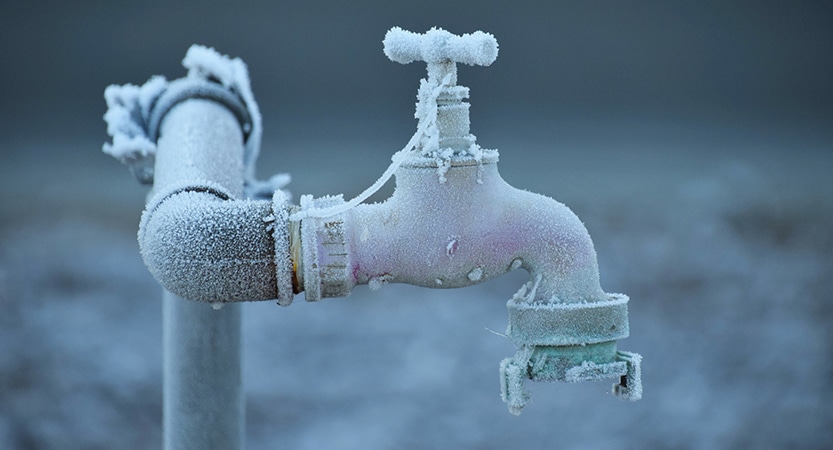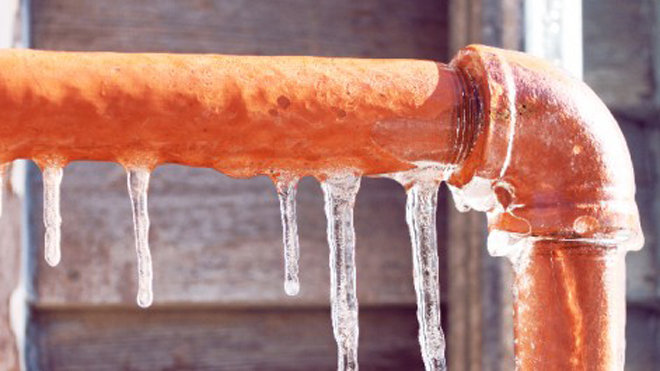Ways to Safeguard Your Plumbing from Freezing: Key Advice
Ways to Safeguard Your Plumbing from Freezing: Key Advice
Blog Article
What're your ideas regarding Helpful Tips to Prevent Frozen Pipes this Winter?

Cold weather can damage your pipes, specifically by freezing pipes. Here's exactly how to avoid it from occurring and what to do if it does.
Intro
As temperature levels decline, the threat of icy pipelines rises, possibly bring about pricey fixings and water damages. Recognizing exactly how to avoid frozen pipes is crucial for homeowners in cool environments.
Avoidance Tips
Insulating vulnerable pipelines
Wrap pipes in insulation sleeves or make use of heat tape to protect them from freezing temperatures. Concentrate on pipelines in unheated or outside locations of the home.
Home heating strategies
Keep interior areas appropriately heated up, especially locations with plumbing. Open cupboard doors to allow cozy air to distribute around pipes under sinks.
Just how to identify icy pipelines
Try to find decreased water circulation from taps, unusual odors or noises from pipes, and noticeable frost on subjected pipelines.
Long-Term Solutions
Architectural adjustments
Think about rerouting pipelines far from outside wall surfaces or unheated locations. Include extra insulation to attics, basements, and crawl spaces.
Upgrading insulation
Invest in premium insulation for pipelines, attics, and walls. Appropriate insulation helps maintain consistent temperatures and lowers the threat of icy pipes.
Safeguarding Outdoor Pipes
Yard hose pipes and outdoor taps
Detach and drain yard pipes before winter. Mount frost-proof spigots or cover exterior faucets with insulated caps.
Recognizing Frozen Pipelines
What causes pipes to ice up?
Pipelines ice up when exposed to temperatures listed below 32 ° F (0 ° C) for expanded durations. As water inside the pipelines freezes, it expands, putting pressure on the pipe wall surfaces and potentially triggering them to break.
Risks and damages
Icy pipes can result in supply of water disruptions, residential property damage, and costly repairs. Ruptured pipes can flood homes and trigger comprehensive architectural damage.
Indications of Frozen Pipeline
Recognizing frozen pipelines early can stop them from bursting.
What to Do If Your Pipes Freeze
Immediate actions to take
If you believe icy pipes, maintain faucets open to eliminate stress as the ice melts. Use a hairdryer or towels taken in warm water to thaw pipes slowly.
Verdict
Protecting against icy pipes calls for positive measures and fast reactions. By understanding the reasons, signs, and safety nets, property owners can shield their plumbing throughout cold weather.
Helpful Tips to Prevent Frozen Pipes this Winter
UNDERSTANDING THE BASICS: WHY PIPES FREEZE AND WHY IT’S A PROBLEM
Water freezing inside pipes is common during the winter months, but understanding why pipes freeze, and the potential problems it can cause is crucial in preventing such incidents. This section will delve into the basics of why pipes freeze and the associated problems that may arise.
THE SCIENCE BEHIND FROZEN PIPES
When water reaches freezing temperatures, it undergoes a physical transformation and solidifies into ice. This expansion of water as it freezes is the primary reason pipes can burst. As the water inside the pipe freezes, it expands, creating immense pressure on the walls. If the pressure becomes too great, the pipe can crack or rupture, leading to leaks and water damage.
FACTORS THAT CONTRIBUTE TO PIPE FREEZING
Low Temperatures: Extremely cold weather, especially below freezing, increases the risk of pipes freezing. Uninsulated or Poorly Insulated Pipes: Pipes located in unheated areas, such as basements, crawl spaces, or attics, are more prone to freezing. Insufficient insulation or lack of insulation altogether exacerbates the problem. Exterior Wall Exposure: Pipes running along exterior walls are susceptible to freezing as they encounter colder temperatures outside. Lack of Heating or Temperature Regulation: Inadequate heating or inconsistent temperature control in your home can contribute to frozen pipes. PROBLEMS CAUSED BY FROZEN PIPES
- Pipe Bursting: As mentioned earlier, the expansion of water as it freezes can cause pipes to burst, resulting in significant water damage.
- Water Damage: When pipes burst, it can lead to flooding and water damage to your property, including walls, ceilings, flooring, and personal belongings.
- Structural Damage: Prolonged exposure to water from burst pipes can compromise the structural integrity of your home, leading to costly repairs.
- Mold and Mildew Growth: Excess moisture from water damage can create a favorable environment for mold and mildew growth, posing health risks to occupants.
- Disrupted Water Supply: Frozen pipes can also result in a complete or partial loss of water supply until the issue is resolved.
WHY CERTAIN PIPES ARE MORE PRONE TO FREEZING
- Location: Pipes located in unheated or poorly insulated areas, such as basements, crawl spaces, attics, or exterior walls, are at higher risk of freezing.
- Exterior Pipes: Outdoor pipes, such as those used for irrigation or exposed plumbing, are particularly vulnerable to freezing as they are directly exposed to the elements.
- Supply Lines: Pipes that carry water from the main water supply into your home, including the main water line, are critical to protect as freezing in these lines can affect your entire plumbing system.
- Underground Pipes: Pipes buried underground, such as those connected to sprinkler systems or outdoor faucets, can be susceptible to freezing if not properly insulated.
https://busybusy.com/blog/helpful-tips-to-prevent-frozen-pipes-this-winter/

As a passionate reader about Winter Plumbing Precautions: Preventing Frozen Pipes, I imagined sharing that short article was smart. Sharing is nice. You just don't know, you will be helping someone out. Thank you so much for going through it.
Visit My Website Report this page